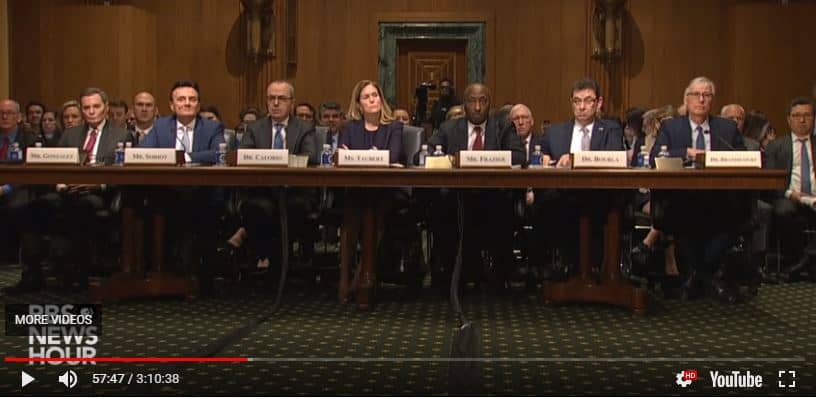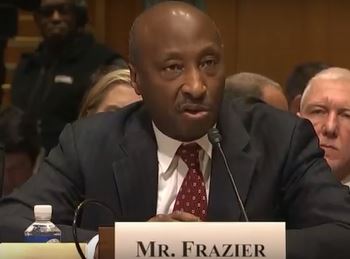
Image: PBS News Hour
Yesterday’s much anticipated US Senate inquiry provided a welcome spectacle for anyone who enjoys seeing big pharma executives given a good scolding on their drug pricing tactics, but produced only modest progress on how one of America’s biggest issues might be addressed.
Answering the questions were AbbVie’s Richard Gonzalez, AstraZeneca’s Pascal Soriot, BMS’ Giovanni Caforio, J&J’s pharma division head Jennifer Taubert, Merck & Co’s Ken Frazier, Pfizer’s Albert Bourla and Sanofi’s Olivier Brandicourt.
AbbVie’s Gonzalez felt the greatest heat in the questioning, with Democrat senator Ron Wyden attacking the company’s ‘price gouging’ and ‘patent thicket’ tactics.
He pointed out how the company had doubled the price of a year’s supply of Humira from $19,000 to $38,000 from $19,000 over a period of six years, and likened AbbVie to the elf-like creature Gollum in Lord of the Rings, which is corrupted by its lust for the powerful ring.
“Can the patients opt for a less expensive alternative? They can’t, because AbbVie protects the exclusivity of Humira like Gollum with his ring. Thick cobwebs of patents and shadowy deals with drugmakers, all of them are in place to keep the cash flowing,” said Wyden.
While there was plenty of harsh words for all the companies present from Wyden and the committee’s chair, senator Charles Grassley, the pharma CEOs were given a chance to set out their own ideas over the three hour hearing.
There was broad consensus among the pharma chiefs on some issues: they backed a plan to ban rebates to insurers and pass them on to patients, called for faster biosimilars uptake, a cap on Medicare out of pocket payments, and supported value-based payments as a future pricing model.
Equally, there were a few familiar themes on which the execs wouldn’t give ground. They opposed the “international price index” model proposed by the Department of Health and Human Services to link the US to other nation’s prices, hit out at “freeloading” from other countries, and said high list prices were part of a complex market, which needed to be addressed holistically or otherwise risk harming pharma R&D investment.

Merck & Co’s Ken Frazier said:
“I understand why patients are frustrated because they need these medicines and they can’t afford them. I would pledge to do everything that we could, but this system is complex… no one company can unilaterally lower list prices without running into financial and operating disadvantages which make it impossible to do that.”
The devil will be in the detail in any future legislation that is passed. There was support for the Trump administration proposal to ban rebates to pharmacy benefit managers on Medicare and pass the estimated $29 billion in these fees directly to patients.
AstraZeneca’s Pascal Soriot said he would go a step further: “If rebates were removed from the commercial sector as well, we would definitely reduce our list price.”
This was clearly just the beginning of the debate – but one in which momentum for change is growing. Senator Grassley has indicated that health insurers and pharmacy benefit managers (PBMs) – often seen as the other big part of the problem in US healthcare – will be next to face a grilling.
Despite being a longstanding critic of pharma’s pricing, Grassley has also indicated he wants to work with the sector on reform if possible. He has reiterated his opposition to direct government negotiation, and is sceptical of HHS Secretary Alex Azar’s proposal to tie Medicare Part B prices to the lower prices paid in other comparable countries.
Grassley is open to working with Democrats on other drug price policies, which could include the Creates Act. This proposed legislation would clear barriers to faster generic drugs and biosimilars. The bill faced concerted opposition from industry trade group PhRMA last year, but yesterday several of the CEOs said they would support it – indicating that pharma is ready to make the necessary compromises to head off more radical reforms.
Watch the full recording of the hearing here.




